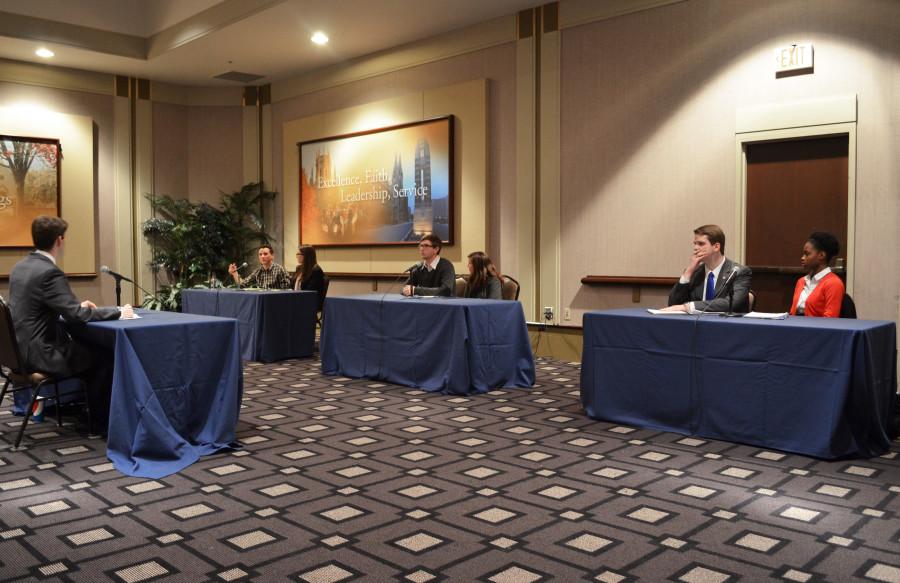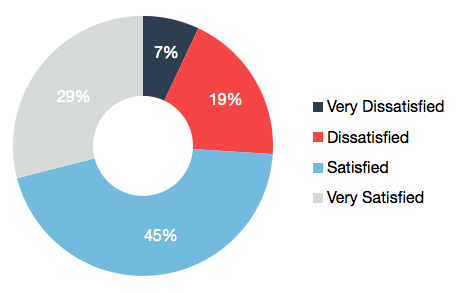Freshmen packed the Helfaer Theatre Oct. 7 during one of three special advising sessions for College of Communication students. Joyce Wolburg, associate dean of the college, explained class selection rules and new changes that have been made to them.
The sessions were held three weeks before advising week, in which students will plan for classes in the spring and discuss their academic careers.
The event took place during discussions of advising reform for the university. The university wide mean level of undergraduate advising satisfaction is 2.95 out of a four-point scale, according to the 2011 “Student Satisfaction with Academic Advising” survey conducted by Marquette Student Government.
Chinaza Nwaneri, a freshman in the College of Communication, said the session was beneficial in clarifying the process of choosing classes for next semester.
“I know I’m not going to freak out because they gave me a back up plan too,” Nwaneri said. “I liked how my adviser told me to take classes in my major now and get a feel for it.”
Survey Results

MUSG’s Student Satisfaction with Academic Advising survey was completed by 858 full-time undergraduate students and contained several questions about the varying advising systems among Marquette’s different colleges.
The survey reported that the College of Education had the lowest average level of advising satisfaction, clocking in at 2.67 out of a four-point scale. The College of Business Administration was the second lowest with 2.80, followed by the College of Communication with 2.81.
The survey also reported that the lowest levels of dissatisfaction were claimed by freshmen, 19.6 percent of whom said they were either “dissatisfied” or “very dissatisfied” with their advising experiences. Seniors, on the other hand, had the highest levels of advising dissatisfaction with 28.6 percent indicating they were “dissatisfied” or “very dissatisfied.”
Zachary Baer, a junior in the College of Business Administration, is among those who are dissatisfied with advising.
“You have to do it all on your own, otherwise you really will get nothing out of the meetings,” Baer said. “If you go in there expecting them to provide something for you, it’s not going to do much for you.”
Sam Schultz, MUSG president and senior in the College of Arts & Sciences, was an active advocate for academic advising reform while running in the 2012 MUSG presidential race.
“For every great adviser, there’s one who doesn’t view it as part of their job as faculty, which we as students think it is, and the university seems to tell them it is,” Schultz said. “I think students, if they’re not happy with their adviser, can always request a change.”
Advising systems at other colleges
The majority of Marquette’s academic advising is conducted by professors who advise in conjunction with their teaching duties. Advising reform decisions are mainly handled by deans. Each college conducts advising differently depending on what the academic program entails.
A more in-depth look at how advising works in each undergraduate college’s advising system is presented in the chart below.
Other Jesuit universities differ significantly from Marquette in terms of advising procedures.
For example, DePaul University assigns each of its students a faculty adviser in their major department. In addition, each of its colleges has a staff of full-time, professional advisers that students can make appointments with when needed.
At Loyola University in Chicago, all undergraduate freshmen are advised by their first-year seminar instructor during their initial semester. Then for the rest of the first and second year, each student is assigned a faculty adviser who “are expert instructors and advisers” in each major, according to the university’s website. Students are reassigned an academic adviser for their last two undergraduate years who works as a complement to the faculty advisers.
The University of Scranton in Pennsylvania is a smaller Jesuit school with about 4,000 undergrad students and three undergraduate colleges. The freshmen advisers are assigned staff members from the College of Arts & Sciences Advising Center. Students receive a faculty adviser in the department of their major for their last years of undergraduate studies.
Richard Holz, dean of the College of Arts & Sciences, said he was interested to hear how other universities advise their students. He said he’s always looking to improve advising in his college.
“I discuss advising with students anytime I interact with them during college and university events,” Holz said. “In the spring I would like to hold, if possible, a town hall style meeting with students to hear their concerns around advising.”
The possibility of professional advising at MU
As advising reform is welcomed throughout the university, the idea of hiring more professional advisers has been advocated as an alternative to faculty advisers, especially in the College of Arts & Sciences.
The college already has six professional advisers, who advise first and second year students. However, every other college requires its professors to perform most of the advising duties.
Shannon McCormick, a freshman in the College of Communication, is one of many students who expressed interest in having more access to professional, full-time advisers.
“I think (more professional advisers) would be helpful because all of their attention would be on (advising),” McCormick said. “I think advising’s really important and shouldn’t be put by the wayside.”
Schultz said he thinks more professional advisers could be used to handle the scheduling aspects of advising.
“Every student would have this professional adviser who is responsible for their scheduling and then they’d have a faculty mentor who is responsible for advice in regards to the major and career goals,” Schultz said.
Tina McNamara, director of undergraduate advising in the College of Education, is a professional adviser who mainly works with freshmen, transfer and study abroad students, but helps some sophomores as well. While she did not say that more professionals will be included in the College of Education, she said the college is starting to expand its advising training.
“We just added two more faculty advisers this semester,” McNamara said in an email. “We will also have another staff person taking on some advising responsibilities in the spring.”
Some students see faculty advisers as advantageous since professors are already professionals in their respective fields.
“Faculty are great mentors in their field, they know their own field,” Schultz said. “I would never want professional advisers to completely take over the role of faculty.”
Advising reform in the College of Nursing
The College of Nursing already began advising reform, as it established a new advising system this fall.
The new system created the Academic Services Center, consisting of an academic advising coordinator and academic adviser and clinical placement coordinator. The individuals occupying those roles are collectively responsible for advising and developing academic program plans for freshmen, sophomores, students studying abroad, members in the ROTC and “off-track” nursing students.
The College of Nursing’s advising system previously consisted of one academic advising coordinator assisting freshmen and students in special tracks, and faculty advisers for sophomores, juniors and seniors. The change was prompted by an increase in enrollment, feedback from an alumni survey and an ongoing transition to the college’s undergraduate curriculum.
Kerry Goepfret, dean of the College of Nursing, said no new staff members were hired for the Academic Services Center.
“The college critically reviewed the duties and responsibilities of all of the college (of nursing) staff and restructured to best meet the needs of our undergraduate students,” she said.
The role of students
The quality of advising does not depend solely on faculty, however. Students also have responsibilities in the advising process, especially attending advising sessions.
“I’ve talked to faculty and they complain about students not going to their assigned advising sessions,” Schultz said.
In addition, it’s important for students to bring the correct advising materials with them. The communication between students and faculty, primarily done through email, about which advising materials are necessary, is handled differently depending on the college.
Schultz said he has seen students complain to their friends about bad advising experiences, but he challenges students to be active and channel those complaints in a more helpful direction.
“When students only complain to their friends, the adviser is never getting feedback saying they’re a bad adviser so they’re just going to continue doing the same thing,” Schultz said.
Anthony Frigo, a junior in the College of Business Administration, said students ought to actively seek academic help from many faculty members.
“My adviser is Michael Dole who is a great resource if I have any questions and so are all my teachers,” Frigo said. “In general, it is always good to obtain several perspectives when making a decision and different teachers may offer different advice.”
MUSG holds an open forum for students every Thursday at 7:30 p.m. in the Alumni Memorial Union in Room 227, and Schultz said he would love to see more students attend.
“(MUSG) would love to hear about issues students are having with advising,” he said. “We’re always looking for questions, complaints, concerns with advising and we have committees set up that’ll do their best to address those concerns.”







